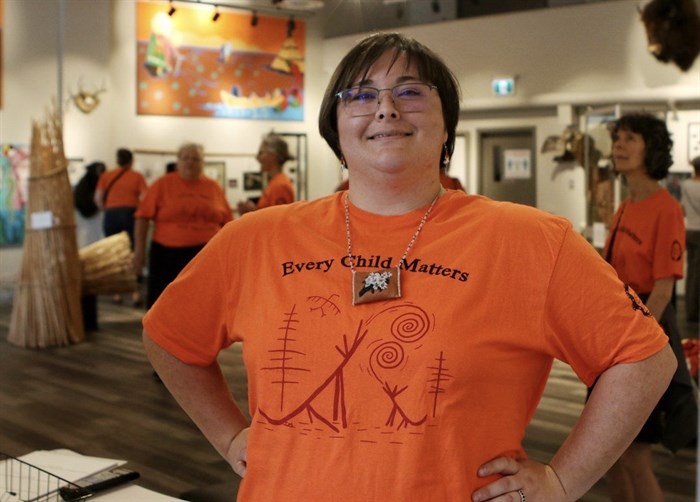
FILE PHOTO - Coralee Miller of Westbank First Nation, the docent at the Snc?wips Heritage Museum, stands inside the museum during the launch of its “What does it mean to be syilx?” exhibit on Sept. 30, 2022.
Image Credit: Aaron Hemens, Local Journalism Initiative
August 20, 2023 - 6:00 AM
Starting at the end of the month, the Sncewips Heritage Museum in stqa?tk??cni?wt (Windy Bay, also known as Westbank First Nation) will be hosting a four-part cultural competency training series.
The education sessions from syilx community members are designed to give the wider public a better understanding of the history of European settlement in the territory and how colonialism continues to affect Indigenous communities today.
“We are reminded that this is something that is still in process,” said Coralee Miller of Westbank First Nation (WFN), who serves as the museum docent at Sncewips. “This is the situation that we have inherited.”
This is the second year that Sncewips is hosting the series, which is being facilitated by Pamela and Wilfred “Grouse” Barnes, WFN Elders and knowledge keepers.
The series will explore the syilx worldview and what life was like pre-contact, such as how communities lived and governed themselves before European settlement.
It will then get into a broader teaching of colonization across so-called Canada, from early settlement initiated by the Doctrine of Discovery and terra nullius to assimilative policies such as the Indian Act and the residential school system.
“It teaches non-Native people and Native people why things are the way they are and why we are trying to change those policies,” said Miller. “And how it is difficult to be Indigenous within a colonial construct and how we work around that.”
While the series will focus on learning the truth and unlearning aspects of the Canadian mythos, Miller said that it will give non-Indigenous participants valuable insight into how to be a better ally, and how we can move together towards reconciliation.
“The biggest lesson you’re going to learn is that without acknowledgement, there can’t be reconciliation,” she said.
She added that she’d noticed a shift in more non-Indigenous people wanting to learn the truth about Canada, but there remains a lot of unlearning to do and white fragility to overcome.
“Having to face white privilege — a lot of people don’t want to acknowledge that they have privilege, that there is white supremacy within Canada, within the States, within our policies,” she said. “Everything was created for settlers, and we are not a part of that.”
For those who say that colonialism is a thing of the past, Miller reminded them that they benefit from stolen land and stolen culture.
“It doesn’t matter if you personally weren’t involved. You’re still a part of it,” she said.
“Yeah, maybe we specifically didn’t do this, but it’s still our responsibility – it is something that we have inherited. It teaches people what the Canadian and American government has been trying to hide from the general populace.”
And for those who are afraid of confronting the truth, she noted that the truth will always reveal itself.
“We didn’t get a choice. We had to learn it,” she said.
“No one wants to admit they’re racist. No one wants to admit that they’ve had it better because of their skin colour, and that they have been complicit. That’s just the hard truth.”
For Miller, she said that she hopes to make more allies through the series, and to see non-Indigenous people combine their newfound knowledge with their privilege to push for change.
“This is your opportunity to work with us to break that cycle. This is something that we can work on together and move onward and forward,” she said. “It’s all about stitching that community together.”
Each of the four sessions, which begin on Aug. 30, will be facilitated by Pamela Barnes starting at 9 a.m. at the WFN Elders Hall. Lunch will be provided, and the sessions will have a different afternoon activity.
The activity for the first day will be a community core tour led by Miller. The second session on Sept. 6 will feature guest speaker Jordan Coble, a WFN councillor.
Bobbi Tronson, the family program coordinator with WFN, will offer birch bark crafting for the third season on Sept. 13. The fourth and final session on Sept. 20 will be a museum tour led by Miller.
The program costs $500 per person, and participants can register here.
The training is just one of many options available for people in the territory to learn about syilx history and culture.
Grouse and Pamela Barnes, along with their daughter Jasmine Peone, are facilitating similar lessons in the ná?k??ulam?n (what we do) series, which are walking tours of syilx traditional plant usage.
Peone is also continuing to teach introductory nsyilxc?n language lessons through Kelowna Museums.
Miller said that the public can also benefit from visiting the En’owkin educational centre in snpinktn (Penticton), as well as the Osoyoos Desert Centre in sw?iw?s (Osoyoos).
— This story was originally published by IndigiNews.
News from © iNFOnews, 2023